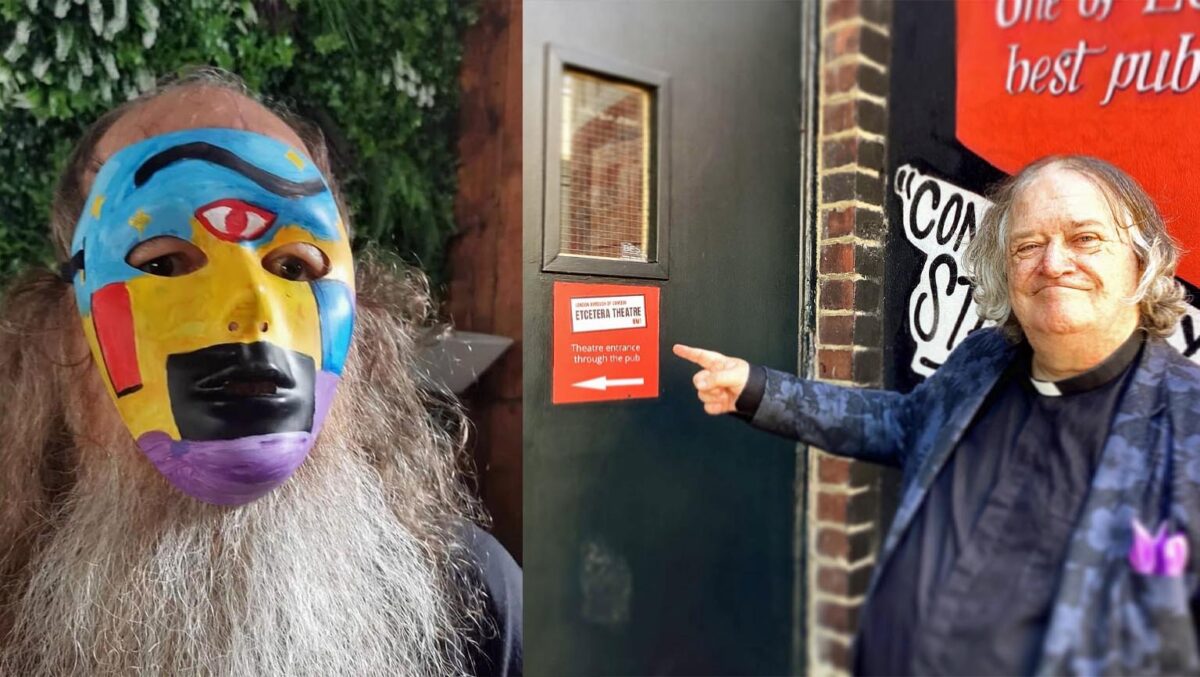
The Basement Gym + Studio opens in Camden Town
Camdenist readers get 50% off their first month’s membership, too

Camden’s answer to the infamous Edinburgh Fringe is back for the whole of August. Now in its 16th year, the festival brings the freshest theatre, comedy, dance and musical shows to the borough.
Caliban needs to leave Liverpool and get back to London. However, as a young transsexual recovering from the boozy wedding reception of two lesbian witches, he will need more than the magic of pronouns to survive this truly surreal odyssey into his enlightenment as a Pagan saint.
Intrigued, we spoke to author David Parry (pictured above right) about the stage adaptation of his poetic work at Camden Fringe 2022. You can see his show, 9-13th of August at the Etcetera Theatre, Camden. Tickets & Info.
How did you come up with the concept of the show you’re taking to Camden Fringe?
Many people have worked very hard to bring this show to the stage, and our ensemble of eleven creatives has also found its conscious resistance to accepted forms of theatre uncomfortable.
This is a project wherein I have closely collaborated with the legendary Russian impresario, Victor Sobchak, as a co-producer. Victor decided that we should take the title from my second critically-acclaimed collection of poems, The Grammar of Witchcraft, as a way of focusing our energies on the adventures of Shakespeare’s Caliban as a magickal misfit.
Certainly, this journey into drama started with my original collection, Caliban’s Redemption, although after a few years had passed I felt that the character hadn’t really reached his goals either in terms of poetry or stagecraft. So my new collection became The Grammar of Witchcraft. Reflected thus, I class myself as a theatrical poet and not the type that writes verses to be read over a polite cup of tea.
Our show is an ABC of self-discovery and not merely an evening out with mates. Phrased differently, it will be an act of enchantment for everyone.
Why should people come and see the show?
It’s fun, sad and also a tragicomedy about the times we live in. Indeed, two of my greatest influences are Felix Barrett and August Strindberg, the latter of which is equally interested in transgression, challenge and delight. Stated so, we’re not aiming simply to entertain our audiences, but challenge their inherited gender perceptions, transphobia, and the limiting norms that have impaled the LGBTQIA+ community for far too long.
We want a relatively immersive production without clear lines drawn between performers and audiences, whilst simultaneously leading our visitors into understanding why theatre can be many things and not merely an amusement. We are retracting the steps of chamber theatre in order to create a spiritual laboratory during the week of our run in the melting pot of Camden.

What does fringe theatre mean to you?
I keep being told that Fringe and Off West End is dying, or already dead. Statements which simply cannot be true due to the fact fringe festivals are more like creative laboratories than merely a series of productions that will probably not be embraced by the mainstream.
From my perspective Camden Fringe is the most significant gathering of performers and artists outside of the Edinburgh Fringe Festival itself. A celebration of life, truth, performance and the avant-garde. As such, the comedy festival is a vital component of future entertainments alongside genuine art seeking to analyse the cultures we inhabit accompanied by those methods required to transcend them.
If your show was a drink, what kind of drink would it be and why?
It would be a strawberry daiquiri, since it’s exotic and flavoursome, along with a touch of magick. Either way, I love strawberry daiquiris on the beach.
What’s something you wish more people knew?
When I first moved to London in the early 1980s, this city was really “something”. It had uniquely British features, a sense of enduring history and a fast array of opportunities for people either passing through or trying to establish themselves in the metropolis to gain a new and better life.
Sadly, many of these excellent attributes have disappeared, although I would argue they have been replaced with a far greater sense of minority rights, a sensitivity towards different communities and a genuine revolution in artistic expression. The only caveat I would add is that the level of theatrical openings needs to keep pace with a hugely multicultural, inclusive enrichment offered to British stagecraft by communities who no longer present audiences with superficial tasters of their culture, but much deeper performances presenting parallel worlds to anything European as well as highly energising alternative uses of the imagination.
Who or what inspires you?
Je suis August Strindberg? Either way, I find myself inspired by film-scripts written by H. G. Wells. Perhaps particularly from his masterful movie, The Man Who Could Work Miracles, whereby the character who has been given supernatural abilities is challenged by a fellow drinker in their local pub, The Long Dragon Inn, by the annoying phrase, “so you say”.
In this regard, or perhaps not, I have found myself using this comedic line in a number of settings usually to do with poetry slams and performances, while its sheer potency in getting up people’s noses makes it a gift to humankind. These sources of inspiration almost demand that something like The Grammar of Witchcraft is staged as an openly-transgressive performance, which wears a very happy smile on its face.
The Grammar of Witchcraft plays at the Etcetera Theatre, 265 Camden High Street, August 9th-13th. Tickets and info here.
Listen to the show’s voice preview below, and discover more from all the artists on the exclusive audio listings page

Camdenist readers get 50% off their first month’s membership, too

A brand new hairdressing and barbering academy has landed in Camden Town and is now seeking style-conscious models and enthusiastic trainees

We speak to founder, Sol, about bringing the studio to Kentish Town

Explore the neighbourhood’s brand new neighbourhood